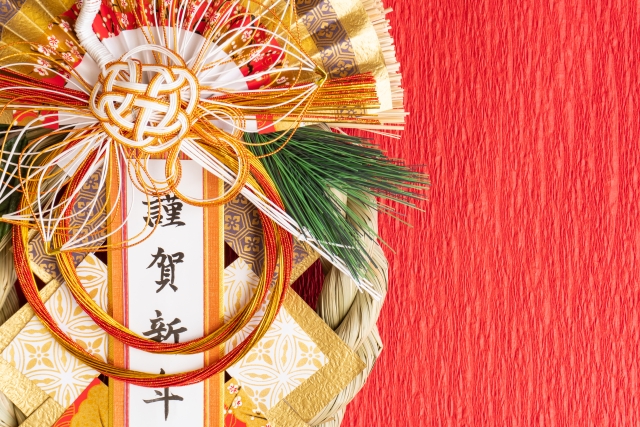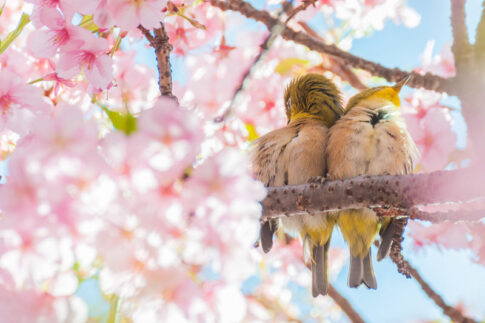1. 新年の挨拶
- Happy New Year!(新年おめでとう!)
一番よく使われる新年の挨拶。 - Wishing you a happy and prosperous New Year!(幸せで繁栄のある新年をお祈りします!)
- Cheers to the New Year!(新年に乾杯!)
- Hope this year brings you happiness and success!(今年が幸せと成功をもたらしますように!)
- Let’s make this year unforgettable!(今年を忘れられない年にしましょう!)
2. 日本のお正月に関連するフレーズ
- How do you celebrate New Year’s in Japan?
(日本ではどのように新年を祝いますか?) - In Japan, we have a tradition called “Oshogatsu,” which is the Japanese New Year celebration.
(日本では「お正月」と呼ばれる新年のお祝いの伝統があります。) - We eat special New Year’s foods, like osechi and mochi.
(おせち料理や餅など、特別な新年の料理を食べます。) - Many people visit shrines to pray for good fortune.
(多くの人が幸運を祈るために神社に訪れます。) - We clean the house thoroughly before the New Year.
(新年の前に家を徹底的に掃除します。)
3. 新年の食べ物や習慣を説明する英語
- Osechi ryori is a traditional Japanese New Year’s meal served in special boxes.
(おせち料理は特別な箱に盛り付けられた日本の伝統的なお正月料理です。) - Mochi is a type of rice cake we often eat during the New Year.
(餅はお正月によく食べるお米でできたケーキの一種です。) - We send New Year’s cards, called “nengajo,” to friends and family.
(友人や家族に「年賀状」と呼ばれる新年のカードを送ります。) - Children receive money as a gift during New Year’s, called “otoshidama.”
(子どもたちは「お年玉」と呼ばれる新年の贈り物としてお金を受け取ります。) - We decorate the house with items like “kadomatsu” and “kagami mochi.”
(家を「門松」や「鏡餅」のようなもので飾ります。)
4. 新年の抱負や目標に関するフレーズ
- What’s your New Year’s resolution?
(あなたの新年の抱負は何ですか?) - My resolution is to improve my English skills.
(私の抱負は英語力を向上させることです。) - I plan to exercise more and eat healthier this year.
(今年はもっと運動して健康的な食事を心がけるつもりです。) - I want to save more money this year.
(今年はもっと貯金をしたいです。)
5. 日本のお正月を説明する際に使える会話例
- Q: How do you celebrate New Year’s in Japan?
A: In Japan, we celebrate Oshogatsu with family. We eat osechi, visit shrines, and give otoshidama to kids.
(日本では、お正月を家族と一緒に祝います。おせちを食べたり、神社を訪れたり、子どもたちにお年玉をあげます。) - Q: What is “osechi ryori”?
A: It’s a traditional Japanese New Year meal served in a lacquer box. Each dish has a special meaning, like good health or prosperity.
(おせち料理とは、漆塗りの箱に入った日本の伝統的なお正月料理です。それぞれの料理には健康や繁栄などの特別な意味があります。)
6. 知っておきたい新年やお正月の単語
- New Year’s Eve(大晦日)
- Countdown(カウントダウン)
- Shrine visit(初詣)
- First dream of the year(初夢)
- Zodiac sign(干支)
- Good luck charm(お守り)
- Traditional decorations(伝統的な飾り)
- Clean slate(新しいスタート/リセット)
これらのフレーズや単語を活用して、新年らしい英会話を楽しんでみてください!🎍
日本の「正月」の過ごし方と歴史
日本の「正月」の過ごし方と歴史
過ごし方 (How People Spend the New Year in Japan)
1. 大掃除 / Year-End Cleaning (Osoji)
年末に家を清め、悪い運を取り除き、新年の幸運を迎える準備をします。
At the end of the year, people clean their homes to purify the space and prepare for good fortune in the New Year.
2. 門松や鏡餅の飾り付け / Decorations: Kadomatsu and Kagami Mochi
玄関に門松を飾り、室内には鏡餅を置いて年神様を迎えます。
People decorate their entrances with kadomatsu (pine decorations) and place kagami mochi (stacked rice cakes) indoors to welcome the New Year deity (Toshigami-sama).
3. 年越しそば / Toshikoshi Soba (Year-End Noodles)
12月31日の夜には長寿を願って年越しそばを食べます。
On December 31, people eat toshikoshi soba, which symbolizes long life and resilience.
4. 初詣 / Hatsumode (First Shrine Visit)
新年を迎えたら神社やお寺に行き、家族の健康や幸福を祈ります。
After the New Year begins, families visit shrines or temples to pray for health and happiness in the coming year.
5. おせち料理 / Osechi Ryori (Traditional New Year Dishes)
新年にはおせち料理を家族で食べます。それぞれの料理には健康や繁栄などの願いが込められています。
Families eat osechi ryori, a set of traditional dishes, each representing wishes for prosperity, health, or happiness.
6. お年玉 / Otoshidama (New Year’s Money)
子どもたちは親戚や家族からお年玉としてお金をもらいます。
Children receive money gifts called otoshidama from relatives.
7. 凧揚げや羽根つき / Traditional Games: Kite Flying and Hanetsuki
正月には凧揚げや羽根つきなどの遊びを楽しむ家庭もあります。
Some families enjoy traditional games like kite flying (takoage) or hanetsuki (a badminton-like game).
歴史 (The History of Japanese New Year)
日本語
正月の文化は、古代中国の暦や儀式が元になっています。平安時代には貴族が新年行事を大切にし、江戸時代に庶民にも広まりました。明治時代以降、西暦を採用し、1月1日が正式な新年となりました。特に「年神様」を迎えるための準備が重要視されています。
English
The culture of Oshogatsu originates from ancient Chinese calendars and rituals. During the Heian period (794–1185), New Year celebrations were significant among the nobility, and these traditions spread to common people during the Edo period (1603–1868). With the adoption of the Gregorian calendar in the Meiji era (1868–1912), January 1 officially became New Year’s Day. Preparing to welcome Toshigami-sama (the deity of the year) is a key custom.
日本の正月の過ごし方とその背景を、併記形式で活用し、英語学習や説明に役立ててください!
手紙や年賀状におすすめの表現
以下は手紙や年賀状に使えるおすすめの表現を、日本語と英語で併記して紹介します。
新年の挨拶 / New Year Greetings
1. 日本語: 明けましておめでとうございます。本年もよろしくお願いいたします。
English: Happy New Year! I look forward to your continued support this year.
2. 日本語: 新年が皆さまにとって素晴らしい一年となりますように。
English: Wishing you a wonderful year ahead.
3. 日本語: 昨年は大変お世話になりました。今年もどうぞよろしくお願いいたします。
English: Thank you for all your support last year. I look forward to working with you again this year.
4. 日本語: ご家族皆さまのご健康とご多幸をお祈り申し上げます。
English: Wishing you and your family good health and happiness.
5. 日本語: 謹賀新年。新しい年が皆さまにとって素晴らしいものになりますように。
English: Happy New Year! May this year bring you great joy and success.
感謝の表現 / Expressions of Gratitude
1. 日本語: 昨年は素晴らしいご縁をいただき、感謝しております。
English: I am grateful for the wonderful connection we made last year.
2. 日本語: いつも温かいご支援に感謝しております。
English: I truly appreciate your continued support and kindness.
3. 日本語: 昨年のご厚情に心より感謝申し上げます。
English: Thank you sincerely for your kindness and support last year.
未来への願い / Hopes for the Future
1. 日本語: 今年が皆さまにとって飛躍の一年となりますようお祈り申し上げます。
English: May this year be a successful and prosperous one for you.
2. 日本語: 新しい挑戦が実り多きものとなりますように。
English: Wishing you success in all your new challenges this year.
3. 日本語: 新たな一年が素敵な思い出で満たされますように。
English: May this new year be filled with wonderful memories.
カジュアルな表現 / Casual Phrases
1. 日本語: 新年、楽しいことがたくさんありますように!
English: Wishing you lots of fun and happiness in the New Year!
2. 日本語: 今年も笑顔あふれる一年を過ごしましょう!
English: Let’s make this year full of smiles and joy!
3. 日本語: 良いお正月をお過ごしください!
English: Have a great New Year’s holiday!
ビジネス向けの表現 / Business Phrases
1. 日本語: 本年も変わらぬご愛顧を賜りますようお願い申し上げます。
English: We look forward to your continued patronage this year.
2. 日本語: ますますのご繁栄をお祈り申し上げます。
English: Wishing you continued success and prosperity.
3. 日本語: 本年もご指導・ご鞭撻のほどよろしくお願い申し上げます。
English: I look forward to your guidance and support again this year.
これらの表現をアレンジして、送る相手やシチュエーションに合わせて使ってみてください!







「正月」は英語で何て言う?新年の挨拶やお正月の英会話フレーズ